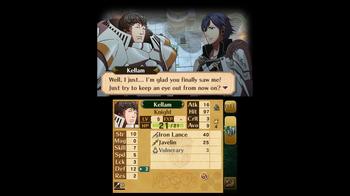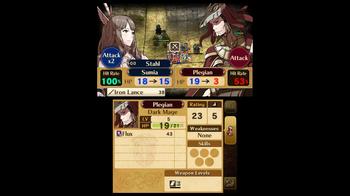
Fire Emblem: Awakening and the spirit of the classics
I know I might be a little late to the party - chiming in a bit after the European launch and an age after the US launch - but wow, Fire Emblem: Awakening is something special.
I have something of an up-and-down relationship with strategy RPGs. I absolutely adore Final Fantasy Tactics and its first Game Boy Advance-based sequel in particular, and on the PS2 the original Disgaea managed to grab me with the same ferocity - but these are exceptions, not the rule. Generally speaking, the genre produces games that I love - but games that I play obsessively for a week or two before tumbling off the wagon - and then I never quite manage to get back on.
That’s the amazing thing about Fire Emblem: Awakening for me - my game clock is climbing higher and higher, but that problem is yet to happen. I’m yet to need a break from its constant strategy challenges - and that is to its credit. It’s something that I haven’t felt for a SRPG since those titles named above - and I’m smitten with the game’s approach.
Credit has to be given to Nintendo for the direction behind the game, then. In an age when hardcore gamers and RPG fans are constantly whipped up into an angered frenzy about games being ‘dumbed down’ - from FFXIII’s auto-battle to Skyrim’s streamlined skill tree - Fire Emblem: Awakening manages to keep the SRPG genre simple without becoming an insult to those not adverse to a learning curve and a challenge.
In truth, even I need a little bit of that streamlining, despite being a self-described RPG nut. It’s when things become too complicated that I tend to let my interest meander, but by trying to ensure the game is accessible enough for the average casual end user and younger players, Fire Emblem’s claws sunk deeper still.
Sure enough, I’m more neurotic about permanent character death and who marries who than those more casual players would be - but that’s how I scratch that hardcore RPG player itch - by obsessing over such systems.
In those areas Fire Emblem: Awakening is just as complex as its rivals and forebears, but brilliant simplicity in other areas helps to reduce the amount of tasks you’re juggling at once so you can concentrate on those that really matter. The automatic equipment optimization is smart, for instance, and the basic rock-paper-scissors system that drives basic strengths and weaknesses is a constant that must always be considered but never dominates.
The game is considerate, but also doesn’t treat the player as if they’re a fool. Tutorial content is subtly slipped onto the lower screen and can be ignored entirely if you’ve enough intuition to make your way around alone. When the game throws certain concepts at you for the first time such as items that can change or evolve a character’s class, it trusts you to read the item description and get on with it. It’s design that respects the game and the user in equal measure, all too rare now, when most games will pop up a slew of unskippable tutorial text boxes explaining the controls.
When you couple that sort of intelligent, carefully considered design with what is genuinely a great game it’s no surprise that it ends up addictive. Fire Emblem’s story is lengthy and split into short chapter-based segments perfect for handheld play, while its SpotPass and StreetPass functionality adds additional fights to the world map that are difficult to ignore. I’m still working through a massive battle backlog earned from 50 Fire Emblem StreetPasses at last week’s Zelda music concert here in the UK!
Simply put, Fire Emblem: Awakening feels a little bit old-school. It’s ignited the same sort of feeling in me that many RPGs now considered absolute classics did back upon their original release, and its attitude to design, difficulty and player intelligence is commendable in an over-tutorialized age.
Those are lessons a lot of RPGs could learn from, I feel. Sometimes it feels as if some modern releases have been focus-tested into the ground in order to ensure ease of use, but Fire Emblem: Awakening avoids having that feel. Like the golden-age RPGs of the SNES and PS1 era that also boasted mass-market appeal alongside depth, it just feels smartly built - and that’s really hard to argue against.
‘Energy’ and ‘Spirit’ are nebulous terms - but I feel like Fire Emblem: Awakening embodies the energy and spirit of some of the best classic RPGs going in a way few modern games do. That’s not to say modern games are worse - they’re just different in approach, tone and scope. As with when I first played Persona 4, something about this game feels like a blast from the past, like it fell out of 2001 - in the good way.
If you haven’t given Fire Emblem: Awakening a try and consider yourself an RPG fan, you need to correct that. Get moving!

